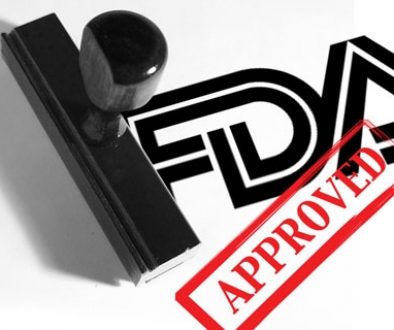New FDA Approvals
A few new drugs have been approved by the FDA so far this year. Among them are treatments for cystic fibrosis, prostate cancer, pancreatic cancer, and two new treatments for HIV.
Symdeko from Vertex is a combination of tezacaftor and ivacaftor for the treatment of cystic fibrosis in patients age 12 years and older. Tezacaftor is a cystic fibrosis transmembrane conductance regulator (CFTR) corrector. Ivacaftor is a CFTR potentiator.
Symdeko is specifically indicated for the treatment of patients with cystic fibrosis (CF) aged 12 years and older who are homozygous for the F508del mutation or who have at least one mutation in the cystic fibrosis transmembrane conductance regulator (CFTR) gene that is responsive to tezacaftor/ivacaftor based on in vitro data and/or clinical evidence.
The recommended dose of Symdeko is one tablet (tezacaftor 100 mg/ivacaftor 150 mg) taken in the morning and one tablet (ivacaftor 150 mg) taken in the evening, approximately 12 hours apart. The tablets should be swallowed whole. Symdeko should be taken with fat-containing food.
Adverse effects associated with the use of Symdeko may include, but are not limited to:
- headache
- nausea
- sinus congestion
- dizziness
Erleada from Janssen Oncology was approved in February to treat a certain type of prostate cancer using novel clinical trial endpoint. Erleada works by blocking the effect of androgens, a type of hormone, on the tumor. These androgens, such as testosterone, can promote tumor growth.
“The FDA evaluates a variety of methods that measure a drug’s effect, called endpoints, in the approval of oncology drugs. This approval is the first to use the endpoint of metastasis-free survival, measuring the length of time that tumors did not spread to other parts of the body or that death occurred after starting treatment,” said Richard Pazdur, M.D., director of the FDA’s Oncology Center of Excellence and acting director of the Office of Hematology and Oncology Products in the FDA’s Center for Drug Evaluation and Research. “In the trial supporting approval, Erleada had a robust effect on this endpoint. This demonstrates the agency’s commitment to using novel endpoints to expedite important therapies to the American public.”
Adverse effects associated with the use of Erleada may include:
- fatigue
- hypertension
- rash
- diarrhea
- nausea
- weight decreased
- arthralgia
- fall
- hot flush
- decreased appetite
- fracture
- peripheral edema
Advanced Accelerator Applications has recently received FDA approval for Lutathera to treat a type of cancer that affects the pancreas or gastrointestinal tract called gastroenteropancreatic neuroendocrine tumors (GEP-NETs). Lutathera (lutetium Lu 177 dotatate) is a radiolabeled somatostatin analog.
Lutathera is supplied as an injection for intravenous administration. The recommended dose is 7.4 GBq (200 mCi) every 8 weeks for a total of 4 doses.
Adverse effects may include, but are not limited to, the following:
- lymphopenia
- increased GGT
- vomiting
- nausea
- increased AST
- increased ALT
- hyperglycemia
- hypokalemia
Biktarvy from Gilead was approved in February for the treatment of HIV-1 infection in adults.
Biktarvy is specifically indicated as a complete regimen for the treatment of HIV-1 infection in adults who have no antiretroviral treatment history or to replace the current antiretroviral regimen in those who are virologically suppressed (HIV-1 RNA <50 c/mL) on a stable antiretroviral regimen for at least three months with no history of treatment failure and no known substitutions associated with resistance to the individual components of Biktarvy.
Biktarvy is supplied as a tablet for oral administration. The recommended dose is one tablet once daily with or without food.
Adverse events associated with the use of Biktarvy may include:
- diarrhea
- nausea
- headache
TaiMed Biologics has received FDA approval for Trogarzo to treat HIV patients who have tried multiple HIV medications in the past and whose HIV infections cannot be successfully treated with other currently available therapies (multidrug resistant HIV, or MDR HIV). This antiretroviral medication is administered once every 14 days and used in combination with other limited antiretroviral medications.
“While most patients living with HIV can be successfully treated using a combination of two or more antiretroviral drugs, a small percentage of patients who have taken many HIV drugs in the past have multidrug resistant HIV, limiting their treatment options and putting them at a high risk of HIV-related complications and progression to death,” said Jeff Murray, M.D., deputy director of the Division of Antiviral Products in the FDA’s Center for Drug Evaluation and Research. “Trogarzo is the first drug in a new class of antiretroviral medications that can provide significant benefit to patients who have run out of HIV treatment options. New treatment options may be able to improve their outcomes.”
Adverse effects associated with the use of Trogarzo may include:
- diarrhea
- dizziness
- nausea
- rash




